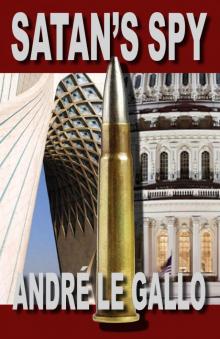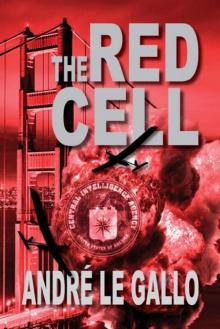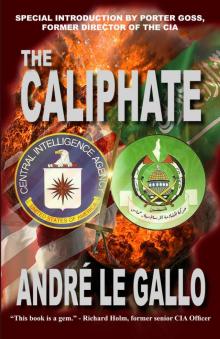- Home
- André Le Gallo
The Caliphate
The Caliphate Read online
THE CALIPHATE
André Le Gallo
D STREET BOOKS
A division of
MOUNTAIN LAKE PRESS
Also by André Le Gallo
Satan’s Spy
The Red Cell
The Caliphate
Copyright 2021 André Le Gallo
Original Copyright © 2012
All Rights Reserved
Published in the United States of America
by D Street Books
a division of Mountain Lake Press
Cover design by Jutta Medina
This is a work of fiction. Any resemblance to real persons, living or dead, except for certain historical figures, is unintentional and coincidental.
No part of this book may be reproduced in any form or by any electronic or mechanical means, including information storage and retrieval systems, without permission in writing from the publisher. The only exception is by a reviewer, who may quote brief excerpts in a review.
For Christopher
Contents
INTRODUCTION by Porter Goss
PART I
1. Paris: Neuilly-sur Seine
2. Neuilly-sur Seine—the next day
3. Tel Aviv
4. Rue du Bac Metro
5. Basilique de Saint-Denis
6. Neuilly-sur Seine
7. Blida, Algeria
8. Rabat, Morocco
9. Casablanca, Morocco
10. Rabat: Tour Hassan Hotel
11. Marin County, California
12. Tour Hassan Hotel
13. Timbuktu, Mali
14. Langley, Virginia: CIA Headquarters
15. CIA Safe House, Virginia
16. Paris: Kella’s Apartment
17. Mali: Aéroport de Tombouctou
18. Timbuktu: Hendrina Khan Hotel
19. Al Khalil’s Office
20. Aéroport de Tombouctou
21. Al Khalil’s Office
22. Hôtel Bouctou
23. Timbuktu
24. Gao, Mali
25. Aéroport de Tombouctou
26. Gao: A Mosque
27. Langley
28. Paris: DGSE Headquarters
PART II
29. Outside Al Khalil’s Office
30. Paris
31. DGSE Headquarters
32. Timbuktu: IMRA Building
33. McLean, Virginia
34. Paris
35. Gaza
36. McLean
37. Brussels: Salim’s Apartment
38. DGSE Headquarters
39. On the Road toward Taba, Egypt
40. Herzlia, Israel
41. Church of the Holy Sepulcher
42. Brussels: Mossad Safe House
43. Jerusalem: El Wad Street
44. On the Road to Ashqelon, Israel
45. Gaza
PART III
06:25 HOURS
06:40
07:20
08:30
09:15
09:30
10:30
13:15
14:38
15:45
15:49
16:03
EPILOGUE
ACKNOWLEDGEMENTS
ABOUT THE AUTHOR
INTRODUCTION by Porter Goss
André Le Gallo’s The Caliphate pours out a tale of exciting intrigue too frightening to believe—and too believable to ignore. But you had better believe it, because Le Gallo is the real thing. I went to spy school with him years ago. He’s a natural as well as a gifted storyteller. As a long-time, top-ranked CIA operations officer, Le Gallo shares with us both what goes on in the convoluted and treacherous world of foreign intelligence and what might happen if we let our guard down.
Set in the volatile evolving areas of North Africa’s Maghreb, a dangerous trail of violence and malevolence takes protagonists Steve and Kella through the sophistication and romance of Paris to the treachery of the Mid-East, areas well known to Le Gallo through his days “in the trade.” At every turn, the increasingly deranged fanatic Tariq Al Khalil escalates the stakes at risk to restore the former glory and power of the ancient Islamic Caliphate—no matter the cost. Le Gallo’s portrayal of Al Khalil reflects convincingly the vicious fanaticism of the radical Islamic fundamentalists we have uncovered since 9/11—and portends eerily those future terrorists who will continue to rally to the bastardization of the Quran by delusional radical leaders with their own agenda.
Le Gallo makes the case why these misguided monsters of inhumanity must be stopped and gives us professional glimpses of just what it takes in the intelligence world to get the job done. Even though The Caliphate is fiction, it captures faithfully many of today’s real-world obstacles confronting the protagonists from all quarters. Intelligence officers in our services will relate to wind-shifting bureaucrats and politicians inside the Beltway, too timid to reward anything deemed risky; hesitant cooperation from supposedly friendly intelligence organizations, which often confounds success; shifting allegiances and devious betrayal by “trustworthy” agents; leaks to the media and sell-outs to enemies of important, sensitive information by confederates; desperate decision-making that must be done on the sketchiest of information; and terrible miscalculations by principal players that can cost innocent lives if not bring us to the brink of destruction.
These are not small matters. Le Gallo does not have to invent these aspects of intelligence work in today’s global struggle for a peaceful world future. He is able from firsthand experience to arm his attractive protagonists with natural resources, life experience, and acquired skill to meet the unexpected twists and turns in a path that takes them ever deeper into danger. Even so, they are not larger than life. They are credible human beings living out a relationship with each other and against a malevolent force that seeks to destroy them. The excitement is palpable; the outcome is uncertain.
It is a fortunate truth that André Le Gallo’s The Caliphate is fiction, but the quest for “the new Caliphate” by radical fundamentalists is not. Their vision of “Restoration” includes full control of much of the geography from the Pacific to the Atlantic, roughly in the Tropic of Cancer: the Philippines and Indonesia through Southern Asia, the “’stans” of Central Asia, the Levant of the eastern Mediterranean, the Horn of Africa, the Maghreb of Northern Africa, and the Sahel of sub-Saharan Africa. It is a vast area with millions of people, many barely surviving in substandard conditions.
While birth rates are generally declining for Western European nations, they are growing in the lands of the envisioned Caliphate. Radical Islamic fundamentalists advertise an intolerant, merciless view toward those not totally submitting to their “pure” interpretation of the Quran, the Hadith—the sayings of Muhammad—or all of the rules and regulations that have been passed down as Sharia law since approximately A.D. 650.
Even though the radicals represent a minority of the world’s Muslims, they are a powerful voice and they have found a growing, receptive audience for their corrupted version of Allah’s will. There is no room for sanctity of life, equal rights, or civil liberty; women are as chattel—or less; Islam is Submission, with a capital “S,” and they decide who must submit to what. A loving, compassionate father god is not included. These people exist. They have struck the innocent countless times already, brutally and with increasingly sophisticated weapons and tactics. And they will strike again! Beware the Caliphate!
Porter Goss lives in southwest Florida, now retired from many years of activity in America’s intelligence community. He was the last Director of Central Intelligence (DCI) and the first Director of the Central Intelligence Agency under the changes enacted by Congress in intelligence reform legislation after 9/11. Prior to that, he served eight terms in the U.S. House of
Representatives, including several years as chairman of the Intelligence Committee. His earlier days as a clandestine services officer in the CIA triggered a keen interest in our national security and an unshakable awareness of how critical good intelligence is for our national well-being.
PART I
Allah Is Our Objective, the Quran Is Our Law, the Prophet is Our Leader, Jihad Is Our Way, and Dying for the Sake of Allah Is Our Highest Hope.
—Credo of the Muslim Brotherhood
Fight and Slay the Unbelievers Wherever Ye Find Them.
—Quran, Sura 9:5
1. Paris: Neuilly-sur Seine
In the darkness, on the city’s outskirts, Farid stood on the ladder leaning against the wall separating the Saudi ambassador’s and the American’s back gardens. Wearing designer glasses and dark silk slacks, he seemed more like an aging poster-boy for the business-casual look than the typical second-storey man. In fact, Farid bin Abdullah was one of the thousands who depended on the patronage of the five-thousand royals of Saudi Arabia. A distant cousin had obtained this choice Paris assignment for him. The American’s powerful security lights provided an excellent view of his garden and of the double stairway that led from the gravel walkway to each side of the patio on the first floor. On the patio, a French window was slightly ajar, as he had been told it was on warm nights. He lifted one leg up and, for a moment, stayed prone on the wall. He was conscious that he was about to leave the diplomatic immunity of the Saudi ambassador’s residence to enter the infidel’s space. He felt as though he was crossing the border between the land of Peace, the Dar al Islam, and the land of War, the Dar al Gharb. More accustomed to diplomatic cocktails than to surreptitious entries, he had never been a risk-taker. But he was confident in his ability to recognize a low-risk, high-reward mission; just as he was confident that the warmth of the night was the cause of his perspiration.
Before letting himself down, he pulled the aluminum ladder up. His sweating hands and the unexpected weight caused the ladder to hit the wall. The noise resounded into the quiet night of the residential suburb and was answered by a filthy dog yelping several houses away. He froze for a second, looking at the back of both residences, but he noticed no movement. Straining, he brought the ladder down on the American side of the wall. He descended the ladder and kept to the narrow grass and dirt strip at the foot of the wall to avoid the noisy gravel as he approached the stairs.
Farid knew that the house was empty. The American’s cook, Benjamin, obviously a Jew, had told the Saudi maid that Dr. Coogan was going away for a couple of days and that he, Benjamin, was going to stay with a friend during that time. That was when Farid decided this would be the perfect time to carry out Tariq al Khalil’s order. He corrected himself, al Khalil, a Salafist, didn’t give orders to an officer of the Kingdom’s Al Mahabharata Al A’ amah (General Intelligence Directorate). However, both the international Salafists and the Saudi Wahhabists, who basically agreed on the need for a pure Islam based on the earliest writings, were outraged at Dr. Coogan’s public statement that newly surfaced Quranic documents were causing the academic community to question the uniqueness of the Quran, a blasphemous concept. The word of God was incomparable and unchanging. There was only one Quran, unlike the gospels, which allowed the Christians to choose one they liked best. His mission tonight was to find the Quranic forgeries that Coogan certainly kept in his house.
When he reached the French windows, he took off his Gucci belt and folded it into a loop, which he then introduced through the slightly open doors and above the handle. He placed the loop around one side of the horizontal handle and pulled up, disengaging the iron rods secured into the bottom and top of the door frame. He pushed and both windows opened.
His flashlight scanned the room—a large dining room table was the centerpiece. China and crystal-ware glass-front cabinets lined one wall and paintings the other. Documents could be hidden almost anywhere. Luckily, there was no one home, and he felt unhurried. He moved to the next room, an office. The walls were covered with photographs of a person he assumed was Coogan with European and Middle Eastern personalities. He first emptied desk drawers filled with business cards, files on investments and newspaper and magazine articles on the Middle East. His heart skipped a beat when he saw one file neatly named “Quran Project.” He opened it but there was only one letter from the German Knights of St. John (Hospitaller) informing Dr. Coogan that documents pertaining to the Quran had been donated to a research institute in Berlin. Nothing new about that. The original information had come from Germany. He guessed al Khalil had a source in the institute but had been unable to find the documents, the forgeries, in Germany. He dropped the file onto the floor.
He was moving toward a file cabinet when he heard a door open downstairs. The click of a light switch followed by the squeaking of the stairs leading up to the office and dining room level broke the silence. The stairway light intruded onto the file cabinet. His surprise and alarm doubled his pulse. He stepped back into the dining room away from the stairs. Shocked and angry, his first instinct was revenge and punishment. Bad information was turning an easy mission, for which he stood to be rewarded, into a possible confrontation, for which he had not planned and was not prepared. The stupid maid would suffer consequences. He felt sweat from his armpits and his back start to soak his shirt.
The rustle of soft clothing and of quick breathing forced him back into the moment. He began to move toward the French windows, his escape route. However, this might be his only chance. The forgeries must be found. He cared less about al Khalil than of the favors the Mukhabarat’s director was sure to bestow on him if he succeeded. After tonight, Coogan would certainly either hire professional security or bring the documents elsewhere, perhaps to a bank vault. He peered carefully through the doorless entrance of the office toward the stairs. The light outlined a man in sweats and a tee-shirt with long unruly blond hair, probably an American, a domestic whom he could overwhelm easily. It must be Benjamin, the cook, who had lied and was thus responsible for this crisis. The cook’s appearance turned Farid’s anxiety into pent-up anger waiting to be released.
The American stepped into the office and switched the light on. “Holy shit,” he said. He stood in the middle of the room uncertainly looking at the wreckage on the floor. He scanned elsewhere, his mouth half-open and his eyes searching into the darkness of the dining room. He took two steps forward and paused then turned around and stage-whispered to himself, “The police.”
Benjamin moved toward the phone on the desk. Farid knew he had to decide: flee or attack. He stepped into the office, raised his flashlight and brought it down as hard as he could on the blond head. The plastic lens of the light flew off, and the battery compartment broke. Benjamin fell to his knees. Farid looked around for a better weapon, grabbed a desk lamp, and again struck. This time his victim fell face-forward. Farid leaned down and felt the man’s pulse. He was alive but unconscious. A rivulet of blood seeped from his scalp down onto his face. As it approached his mouth, Farid, captivated, watched the red line reach Benjamin’s chin, his throat, and his tee-shirt.
Farid stood with a slight grin, listened carefully and, leaving the lights on, went to the filing cabinet. Drawer by drawer, he quickly examined all the files, dropping them onto the floor afterward. He looked at the photos on the wall, took the biggest one and tore the back off. He did the same to several others with no better results. He went through all of the books on the shelves, shaking them with the binding up, and dropping them on the floor. He then went up one flight of stairs and found the main bedroom. He ransacked it but found nothing of interest. He returned to the dining room and examined the backs of the paintings by cutting them out of their frames. Al Khalil’s information had been wrong. In frustration, Farid tried to topple one of the china cabinets, but it proved too heavy, even in his excited state, to do easily. Before leaving, he took a candlestick holder from the dining room table and smashed it into the one of the cabinet glass doors.
<
br /> 2. Neuilly-sur Seine—the next day
Steve Church stepped out of the taxi, relieved that the first leg of his trip was finally over. He stretched, feeling all the vertebrae along his six-foot-one spine release and ran his hand through his short brown hair. He paid the driver and looked at his watch, about ten hours door-to-door from his apartment in McLean, Virginia, to his temporary abode in Neuilly. Waist-high crowd-control barriers had prevented the driver from pulling up next to the curb. His temporary address turned out to be between the Saudi Arabian and Moroccan ambassadors’ residences. On his left was the Saudi flag, green with an Arabic inscription in white. Steve didn’t speak Arabic but knew what it was, the Shahada, the declaration of faith:
La ilaha illa la hu muhammadun rasulu llah.
“There is no God but Allah and Muhammad is his messenger.”
A horizontal sword underlined the Shahada. To his right was the Moroccan flag, red, symbol of the Prophet’s descendants, with a green five-pointed star. Two heavily armed French policemen walked within fifteen feet of the taxi, their eyes cold and their faces like poker players trying to decipher their opponents’ cards. A van with blackened windows was parked twenty yards away; two helmeted paramilitary policemen were talking to the squad sitting inside.
One of the policemen asked him, “Your identity papers, Monsieur.”
Steve produced his passport and the policeman waved him on. Steve walked up to the door and rang the bell, looking for the key that Dr. Coogan had sent him. No one opened the door and Steve let himself in. He found himself in a small entrance way with stairs in front of him and a door to the right that apparently connected to the garage.
He closed the door, picked up his suitcase and hand carry and started up the stairs when the front door opened in back of him.

 Satan's Spy (The Steve Church saga Book 2)
Satan's Spy (The Steve Church saga Book 2) The Red Cell
The Red Cell The Caliphate
The Caliphate